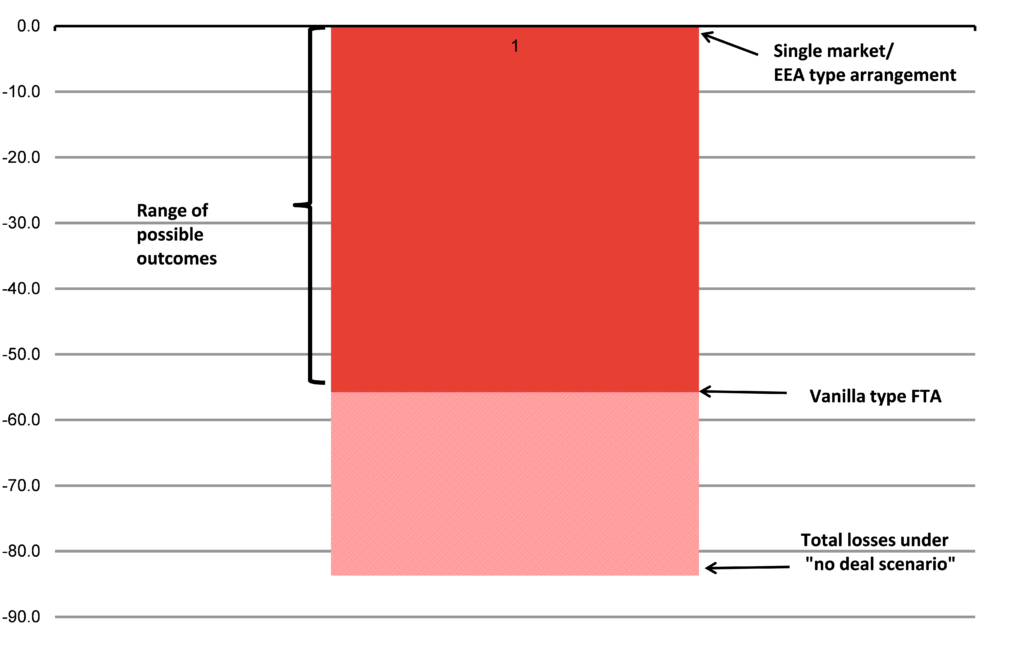
The Long Kiss Goodnight: Negotiating the future relationship between the UK and the EU.
Over the last few weeks, both the UK and the EU have set out their starting positions for negotiations on future arrangements that will bind the two, once the UK has left the EU. The UK Prime Minister did this in a speech that set out five tests for future arrangements, as well as what she called some “hard facts”. These included, notably, a recognition that the UK and the EU would have a lower level of integration than they currently have. This “hard fact” is also recognised in the draft guidelines prepared by the European Council. These confirm the EU’s willingness to negotiate a free trade agreement with the UK, but also state that such an agreement cannot confer to the UK the same level of benefits it currently enjoys, and “cannot amount to participation in the single market”.
More recently, the release of the latest draft of the UK-EU withdrawal agreement on 19 March includes an acceptance that during the implementation period the UK can begin to negotiate free trade agreements with non-EU partners. Together with various provisions on customs procedures, this amounts to a presumption (but not an affirmation) that the UK would not be part of the EU’s customs union under any future arrangement, in line with the stated wishes of the UK Government.
In broad terms, the main issue to which negotiators will devote their energies is the depth of the agreement between the UK and the EU. Both parties have stated that the future agreement will not be as deep as current arrangements. The UK’s position, since it invoked Article 50, has been to start with the level of integration currently enjoyed in the single market, and to see what can be preserved given its desire to rescind free movement of people and repatriate rule-making and enforcement powers. The EU’s position is that given the UK’s views on fundamental aspects of the single market, the starting point would be to take a FTA between the EU and a non-member (Canada is usually cited as an example but there are other possible models) and see what further could be negotiated.
Rolling in the deep
The difference in starting point is important. Research has consistently shown that the depth of a trade agreement matters. By depth, we mean the extent of sectoral coverage and the depth of liberalisation commitments relating to those sectors. The EU’s single market is currently the deepest free trade area in existence, reflecting successive waves of reforms (incomplete as these might have been). By contrast, most other FTAs have, particularly in services, focused on building on formal commitments already undertaken through the WTO, but they have not brought about much change in terms of practice on the ground.
Both the UK and the EU stand to lose from moving from deep to shallow agreements. However, proportionate to overall trade and GDP, the losses to the UK are greater. Figure 1 shows the value at risk to the UK in terms of lost goods and services exports of moving from deep to shallow arrangements (a generic “vanilla FTA”). The UK’s starting point is the upper end, and it would seek to remain as close as possible to that point. The EU’s stated starting point is the lower end. We have labelled this “vanilla type FTA” for convenience, knowing that it generalises across a range of FTAs in force. The vanilla FTA is still better than a “no deal outcome” but is associated with substantial losses.

The space between these extremes is where agreements of progressively greater depth could land. The main obstacle to that approach stems from the EU’s opposition to what it calls “cherry-picking”. That is, it cannot countenance an agreement that includes elements of the current single market (for example, deep commitments on the liberalisation and regulation of financial services trade) that dependent upon coveragewould allow the UK to move from the “vanilla” end of the wedge to progressively deeper arrangements.
With a cherry on top
British ministers have repeatedly held out the possibility of negotiating a liberalisation agreement with the EU which would focus on sectors of particular interest to both sides. However the “no cherry-picking” position is one of the EU’s equivalents of the UK’s “red lines”, so it is worth examining it more closely.
From a purely economic point of view, differential levels of liberalisation, for example by sector or by region, are not a good idea because they reduce the efficiency of resource allocation across the economy as a whole. But in modern FTAs the focus is as much on regulation as it is on liberalisation of traditional trade policy tools like tariffs or quotas. Regulation is context-specific, and there may be sound reasons a priori to allow states to tailor regulation to their own characteristics. In practice, the EU has attempted to strike a balance between harmonisation and mutual recognition of national systems at the Union level, and allowing member states to adapt centrally-agreed regulations to their national circumstances. A sensible starting point for UK-EU negotiations would be to identify sectors where convergence is mutually beneficial and inseparable from liberalisation, and others where this is less important.
The UK has often pointed out that all trade agreements involve “cherry-picking” to some extent. This is probably less a reflection of the economic arguments set out above, and more a reflection of the domestic political sensitivities associated with trade liberalisation and regulatory reforms, which will always have an adverse impact on someone somewhere. With that in mind, trade negotiators typically build flexibilities into the architecture of agreements by negotiating exemptions to particularly onerous disciplines, or by agreeing to negotiate more at a further date.
From the EU’s perspective, while such flexibilities can be used in normal FTAs, they appear undesirable in negotiations focused on changing the terms of relationship between a current member and the larger association which it is leaving. The reasoning is that if this approach is allowed for one member, then others will take advantage of it, leading to a progressive unravelling of the single market.
From Canada to Hotel California
This claim, often asserted with quasi-theological fervour, merits scrutiny. For a start, the best way to avoid any unravelling would be to present a positive case as to why the depth of integration is beneficial. For example, movement of labour is often portrayed as a price that states (or some of them) need to pay for the advantages of free movement in goods and services. In practice, freeing up the movement of people has significant trade-facilitating effects by reducing the costs of access to skills and easing skill bottlenecks. The UK’ s desire to restrict free movement on political grounds to satisfy certain domestic constituencies will amount to imposing an implicit tax on some of its most competitive business sectors.
Secondly, for all its claims about cherry-picking, the EU’s draft negotiating guidelines suggest it is more than happy to cherry-pick when it wants to. Clause 9 of the guidelines in particular, looks to develop various deep commitments on, inter alia, dispute resolution and the UK’s internal taxation regime. All of these are elements that are unheard of in the Canada-type (or Canada plus) agreement the EU thinks is the only one consistent with the UK’s objective. Cynics might describe this particular approach as the “Hotel California” option: if activated, the UK could check-out of the EU, but never really leave.
Hello from the other side
Can both parties navigate their way to sunny uplands? The optimistic view is that the UK’s pronouncements and the EU’s guidelines are opening bids. They can be located on either end of an outcome space (as set out in figure 1).Negotiators will look for compromises that bridge the differences, bearing in mind that from an economic point of view, the deeper the integration on offer, the more the gains. Both sides will have to work out for themselves how those gains stack up against political costs: for the UK, in relation to its stated red-lines and to specially vulnerable sectors; for the EU, in terms of the perception that it is allowing an a la carte option that other members might find tempting.
The more pessimistic view is that progress will be overwhelmed by political factors. On the UK side, that would be an obsession with taking back control of what UK politicians see as the national destiny. On the EU, a determination to punish the UK “pour encourager les autres”.
Both could be addressed (at least partly) if parties were to make a positive case for the negotiations. The UK should find that easier to do now that one of its key requests – the ability to negotiate with other parties from the beginning of the transition period – has been accepted. The EU has contented itself with largely repeating that the UK must be worse off outside the club than inside. This is a strategic mistake insofar as it concedes the possibility that countries can be kept within the EU against what they perceive as their interests. It would be better to make a full-blooded case as to why full membership and participation in the single market is a benefit. This would leave the EU less vulnerable to the perception that a flexible approach to the UK amounted to a concession. Arguably, such a positive case should have been done a long time ago and quite independently of the UK referendum. But better late than never.